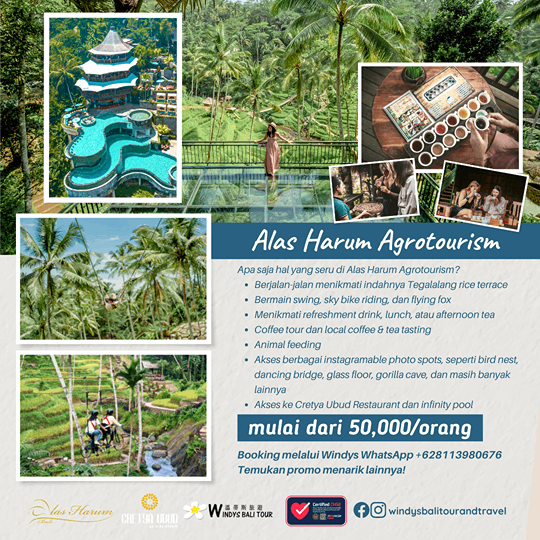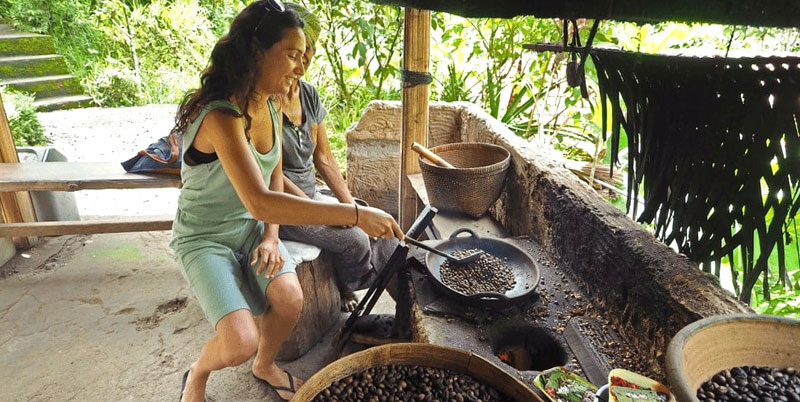Welcome Nature and Journey Via Agrotourism in Ubud
Welcome Nature and Journey Via Agrotourism in Ubud
Blog Article
Discovering the Abundant Culture and Spectacular Landscapes of Agrotourism in Ubud
Ubud, frequently commemorated as the heart of Bali, presents a special possibility for those looking for to experience agrotourism that seamlessly mixes cultural richness with mind-blowing landscapes. As travelers browse through Ubud's lively tapestry of customs, they are invited to uncover the stories behind each cultural practice and landscape feature.
Discovering Ubud's Cultural Heritage
Snuggled in the heart of Bali, Ubud acts as a lively epicenter for those anxious to explore the island's abundant social heritage. Known for its creative practices, Ubud is a hub where ancient methods meet contemporary expressions, producing a special tapestry of cultural experiences. Site visitors are drawn to its myriad of galleries, workshops, and holy places, each providing a glimpse right into Bali's imaginative and historical heritage.
Central to Ubud's social attraction is the Ubud Palace, a significant landmark that stands as a testimony to the area's royal heritage. The royal residence often holds standard dance efficiencies, giving a genuine insight right into Balinese storytelling with dance and songs. Moreover, the roads of Ubud are lined with galleries showcasing jobs of both prominent Balinese artists and emerging talents, showing the island's dynamic art scene.

Immersive Agricultural Knowledge

In addition, Ubud's agrotourism campaigns often include workshops on lasting farming methods. These workshops highlight the value of chemical-free farming, permaculture, and biodiversity preservation, frequently under the advice of experienced specialists. They work as an academic system for travelers, promoting a deeper gratitude for the complexities of lasting agriculture.
Additionally, site visitors can explore coffee and cacao haciendas, where they discover concerning the procedures of growing and manufacturing. Directed scenic tours use in-depth explanations of each step, from bean to cup or cacao skin to delicious chocolate bar, enhancing the total understanding of these substantial agricultural items.
These immersive experiences not only enrich visitors' understanding of Ubud's farming heritage but likewise promote lasting tourism practices, ensuring the preservation of these social landscapes for future generations.
Scenic Rice Terraces and Landscapes
Building on the immersive agricultural experiences, site visitors are attracted to the captivating scenic rice terraces and landscapes that specify Ubud's countryside. The subak irrigation system, a UNESCO-recognized social heritage, showcases a lasting and old technique of water management that continues to sustain local farming.
As visitors traverse the winding courses via the balconies, they are met breathtaking sights that extend across verdant fields, stressed by persuading coconut palms and the distant shape of Mount Agung. The landscape provides a serene background that welcomes consideration and gratitude of nature's appeal (Agrotourism in Ubud). For those curious about photography, the ever-changing light and shadows cast by the sunrise or sunset provide numerous opportunities for recording spectacular pictures
Beyond the terraces, Ubud's moving hillsides and rich plants produce a diverse tapestry that bids exploration. Treking tracks meander via these landscapes, enabling visitors to get in touch with the land look at this website and experience the serene rhythm of country life.
Farm-to-Table Culinary Delights
Among the all-natural beauty of Ubud's landscapes, the farm-to-table activity provides an authentic cooking experience that connects site visitors with the region's farming heritage. This technique commemorates the cooperative partnership in between the land and its produce, with regional farms providing fresh, natural components to Ubud's innovative cooks. Visitors are welcomed to engage in a gastronomic journey where the beginnings click reference of each component are transparently showcased.
In Ubud, farm-to-table dining goes beyond mere usage; it becomes an instructional experience. Dining establishments frequently supply directed excursions of the farms providing their kitchens, enabling restaurants to witness lasting farming techniques firsthand. This connection promotes a much deeper appreciation for the precise care that goes into cultivating the plants and raising animals.
The culinary offerings reflect the rich diversity of Ubud's agricultural landscape, featuring meals that highlight seasonal fruit and vegetables and conventional Balinese flavors. From lively salads teeming with exotic eco-friendlies to aromatic curries instilled with fresh herbs, each plate is a testimony to the area's bountiful harvests.
Furthermore, the farm-to-table principles supports local farmers and neighborhoods, ensuring that farming traditions are protected while advertising economic sustainability. This motion highlights a dedication to top quality, sustainability, and the party of Ubud's one-of-a-kind terroir.
Engaging With Local Craftsmens
Several visitors find themselves mesmerized by the complex workmanship of Ubud's neighborhood craftsmens, whose job mirrors the area's abundant social heritage. These artisans, frequently masters of their craft, contribute significantly to Ubud's lively social landscape. From standard batik fabrics to thoroughly carved wood artefacts, each piece tells a story linked with generations of experience and practice.
Involving with these artisans provides a special possibility to dig deeper into Balinese culture. Numerous workshops provide hands-on experiences, where travelers can learn techniques given through centuries. These interactive sessions not just foster recognition for the artisans' abilities yet additionally supply a significant connection to the region's history and customs.
Visitors can explore craftsmen towns such as Mas, renowned for its great wood carvings, or Celuk, famous for splendid silver precious jewelry. Right here, one can witness the commitment and accuracy called for to create each work of art. Purchasing directly from these artisans makes sure that the earnings support neighborhood communities and sustain typical methods.
In Ubud, engaging with neighborhood craftsmens is not merely a traveler activity; it is an enriching cultural exchange that enhances the agrotourism experience, leaving site visitors with a deeper understanding and gratitude of Bali's creative heritage. - Agrotourism in Ubud
Verdict
The exploration of Ubud's agrotourism uses an extensive recognition for Balinese social heritage and all-natural grandeur. Collectively, these aspects foster a deeper understanding and Look At This recognition of Ubud's sustaining social and natural attraction.
Central to Ubud's social allure is the Ubud Royal residence, a substantial landmark that stands as a testament to the region's royal heritage.Ubud uses a myriad of immersive farming experiences that enable visitors to engage deeply with the island's agricultural way of living.Structure on the immersive farming experiences, site visitors are attracted to the exciting breathtaking rice terraces and landscapes that specify Ubud's countryside.Amidst the all-natural appeal of Ubud's landscapes, the farm-to-table motion provides an authentic culinary experience that connects visitors with the region's farming heritage.Several site visitors discover themselves mesmerized by the elaborate workmanship of Ubud's local artisans, whose job reflects the area's abundant social heritage.
Report this page